How Apollo 11 brought humanity together
By Pallab Gibson From BBC News

As if illuminated by a divine light, the Saturn V rocket shimmered on launch pad 39A at Cape Canaveral, Florida.
Emblazoned with the stars and stripes and cloaked by the gold and crimson of the dawn’s early light, it appeared as American as the nation’s anthem.
In their space suits, three astronauts set out on a mission that would propel them and all humanity into a new era.
An endeavour which was born out of conflict ended by bringing the entire world together, at least for a moment.
The space race to the Moon began on 4 October 1957 when the Soviet Union sent the first artificial satellite into orbit around Earth. Sputnik 1’s impassionate beeps spread terror throughout the US.
There were fears that America’s Cold War foe would soon be able to drop atom bombs from space.
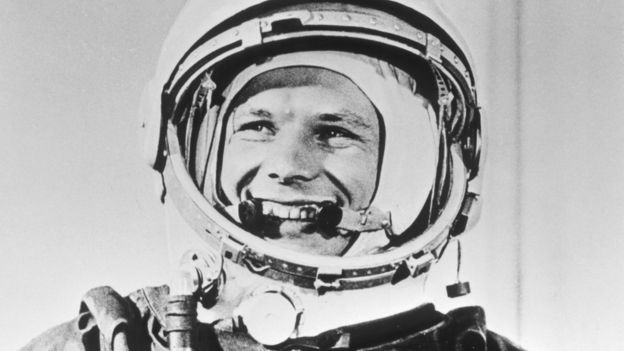

Existential threat
As the Soviets sent the first astronaut into space, completed the first crewed orbit and the first spacewalk, the US administration feared that the communist bloc’s technological superiority would be seen as a demonstration of its ideological pre-eminence.
America faced a threat to its very way of life.
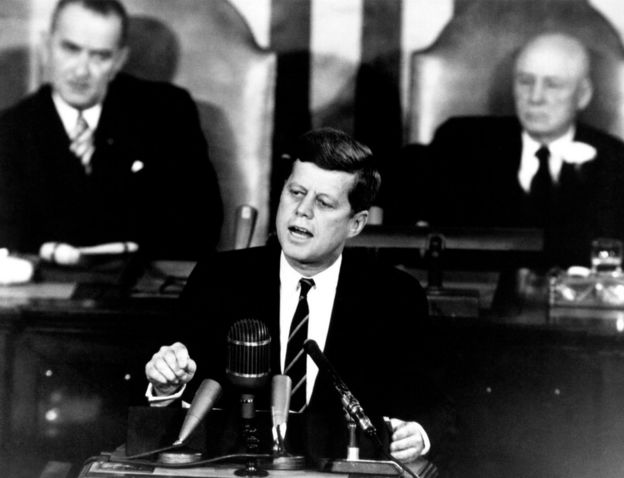

In 1961, President John F Kennedy responded by announcing his plans to send astronauts to the Moon. A year later, at Rice University in Houston, shining and virile as the sun god the space programme was to be named after, President Kennedy galvanised his nation.
“We choose to go to the Moon in this decade and do the other things, not because they are easy, but because they are hard, because that goal will serve to organize and measure the best of our energies and skills, because that challenge is one that we are willing to accept, one we are unwilling to postpone, and one which we intend to win, and the others, too,” he said in his speech.
Just seven years later, commander Neil Armstrong, Edwin “Buzz” Aldrin and Mike Collins were on their way to the Moon.
The Saturn V carrying them roared into the air, rising beautifully into the sky on a perfect summer’s day.
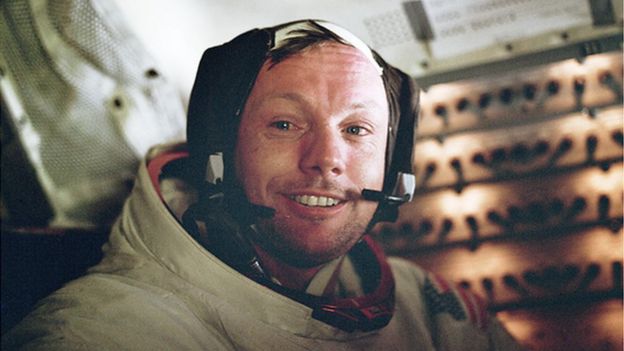

Once safely in orbit, Buzz Aldrin used an early colour video camera to film a pastel blue Earth rapidly receding through the spacecraft window.
Turning the camera in towards the crew area, we see a joyful Neil Armstrong turning upside down in the weightlessness he found himself in.
Four days later, the astronauts had arrived for the riskiest part of the mission.
Dangerous boulders
Amid on-board computer problems, Neil Armstrong took manual control of the landing craft, Eagle, calmly steering it away from dangerous boulders and a large crater.
Buzz Aldrin then spoke the first words spoken by a person on another world.
“Contact light. OK, engine stop…”
Armstrong confirmed what an anxious mission control had wanted to hear:
“Houston, Tranquility Base here. The Eagle has landed.”
Whatever the time zone, people all across the world watched in awe. Six hundred million followed the dark, indistinct pictures live on TV.
In the UK, sleeping children were woken to see Neil Armstrong emerge from the lunar lander in the early hours of the morning. After what seemed an age, he stepped on to the lunar surface, uttering the words that would reverberate through history forever more.
“That’s one small step for man, one giant leap for mankind.”
The astronauts planted America’s flag. But as Neil Armstrong read from a plaque he placed on the lunar surface, it became clear that this was an achievement for all humanity.
“We came in peace for all mankind.”
It was a sentiment expressed by President Richard Nixon as he spoke to the crew of Apollo 11 from the Oval Office of the White House.
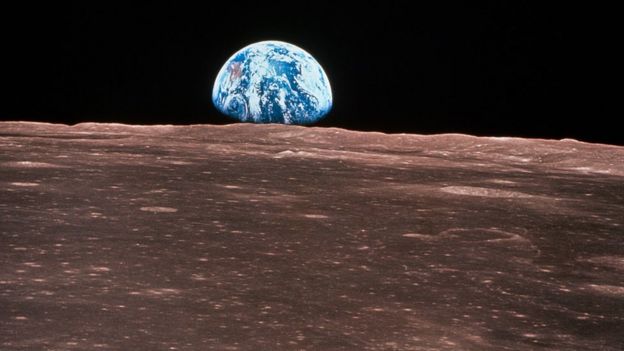

“For one priceless moment in the whole history of man, all the people on this Earth are truly one: one in their pride in what you have done, and one in our prayers that you will return safely to Earth,” he said.
But while the speech by President Kennedy remain vivid, Richard Nixon’s words were quickly forgotten. TV audiences became bored with the Moon landings and the Apollo programme was scrapped, with the final launch in 1972.
At the time, President Nixon was making plans to begin a Christmas mass bombing campaign of North Vietnam and his administration was involved in a break-in at the Democratic National Committee’s offices in the Watergate complex. The US was still riven with conflict and protest.
Darkness returned
The final Apollo mission was the first night launch of the powerful Saturn V rocket. As if mirroring the 10 years of the Apollo era in a few short minutes, night turned to day as the fire from the Saturn V’s powerful F-1 engines bathed Cape Canaveral with a glorious ethereal light. Then, after Apollo 17 had surged upward like a fiery angel, the darkness returned.
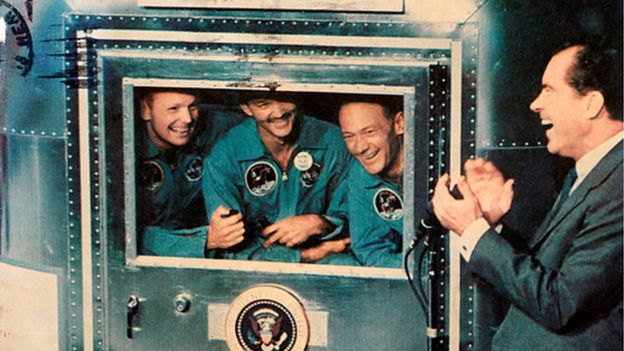

The Apollo era was a time when all things seemed possible. The very stars seemed within our grasp.
Space historian Prof Chris Riley, of Brunel University, believes that the Moon landing led to a cultural transformation for our species that will remain with us.
In his book, Where We Once Stood, about the Apollo missions for older children and teenagers, he says that the spirit of Apollo is as relevant now as it ever was.
“It is endlessly inspiring for what humanity can do when we have to rise to a single impressive challenge. Right now, stopping the worst excesses of climate change seems utterly impossible. There are options to solve it scientifically but it requires a concerted global effort. And the message of Apollo is that is totally achievable,” he says.
For more on this story go to: https://www.bbc.com/news/science-environment-49032105





